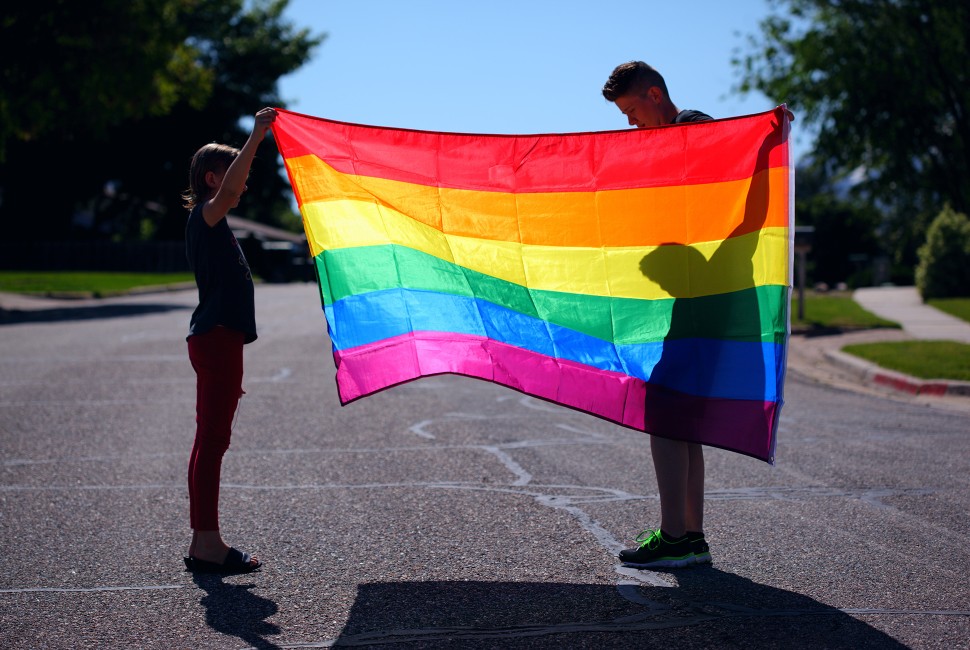When legal systems choose to offer no protections to sexual minorities, even avid LGBTQ supporters would reject their gay neighbors, reports a new Northwestern Medicine study.
The study examined “superficial allies,” or those who express full support for sexual minorities while refusing neighboring proximity to them. The researchers found the absence of legal recognition and protection for sexual minorities at the national level increases sexual prejudice among both allies and stigmatizers.
The research is the first to explore stigmatizing behaviors of people who fully accept homosexuality. Previous research focused solely on people who reject homosexuality.
“While the power of legal exclusion in stigmatization is undeniable, its impact on ally behavior has never been explored,” said author Shahin Davoudpour, a postdoctoral research fellow in the department of medical social sciences at Northwestern University Feinberg School of Medicine.
“Everything we know from research is about the stigmatizing group,” Davoudpour said. “For example, in popular news, the rhetoric focuses on homophobic parents who become allies upon discovering their child is gay. What we don’t ever hear about is the opposite of this: You’re supportive of them, but once they come out, then you no longer want to be neighbors, colleagues or even friends. The dynamic behind this inconsistency between acceptance and inclusion is what I study."
Legal inclusion is the degree to which a society’s legal institutions recognize and protect one’s identity. It can play a powerful role in the reduction of stigma, even among allies, Davoudpour said.
The large, survey-based study examined data from 113 countries with varying degrees of legal inclusion for sexual minorities.
“The more legal protection that existed, the less likely people were to reject association with homosexual neighbors in both stigmatizer and ally groups,” he said.
In the study, 545,531 survey respondents stated their sexual prejudice by choosing between 1 and 10, with 1 being “non-accepting of homosexuals” and 10 being “fully accepting.” Of the 55,523 respondents who rated themselves as a 10 (or “fully accepting”), 4,714 respondents (8.5%) said they did not want a homosexual neighbor. (Read Table 3 in the study for more information.)
“Even though structural change is much slower than individual-level intervention, Dr. Davoudpour’s study clearly demonstrates the impact of policy change (and sustained change) on improving the acceptance of minoritized individuals,” said Gregory Phillips II, assistant professor of medical social sciences and preventive medicine at Feinberg.
Legal inclusion reduces stigmatization
In the past 50 to 60 years of stigma research, Davoudpour said once a society achieves acceptance of a minority group, it tends to forget to fight for that group’s legal rights and inclusion. But he said, based on these findings, this is the wrong approach because these “accepting” groups might still refuse to fully integrate with the stigmatized group.
“We always talk about the people in the middle who can be swayed either way, but we believe the ‘fully accepting’ have dug in their heels, wearing their ally t-shirt proudly,” Davoudpour said. “What I say is that when legal protection for the stigmatized is removed, they have the potential to become stigmatizers. This study shows how allies need certain social and legal infrastructure to flourish into stronger supporters and genuine advocates.”
Davoudpour said a recent example of this is when Pope Francis said, “Being homosexual isn’t a crime,” but likened it to a “sin.”
“This started to get mocked, with people saying, ‘It’s not a crime, but I still go to Hell?’ But I believe that’s not true,” Davoudpour said. “If we change the law to include and protect the stigmatized, even if their rhetoric says it’s a ‘sin,’ we can mobilize the accepting group to their fullest potential. That’s how meaningful change will come about, that’s the key message.”
Superficial allies might be afraid of “courtesy stigma” (stigma by association) when there is no legal protection for sexual minorities, Davoudpour said. For instance, it’s easier to be mistakenly associated with groups with invisible stigmas, such as HIV status or sexual orientation, versus those with visible stigmas, such as race, gender, skin color, etc.
“In absence of legal protection, these fully accepting people might think they can be rejected if they hang out in proximity of gay people,” Davoudpour said. “Perhaps, they are using this as some sort of defense mechanism. ‘I can’t be seen with you because I might get fired. If I don’t punish you, they will punish me.’”
The study was published in the journal Sociological Research Online.


